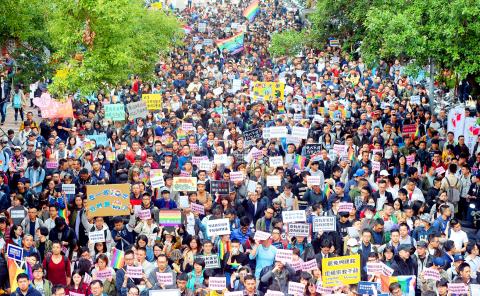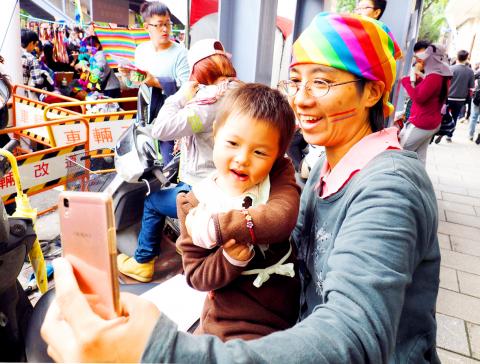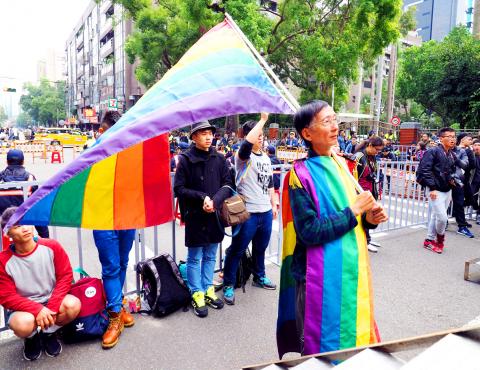The legislature yesterday debated whether to legalize same-sex marriage or pass new partnership legislation during a second and final public hearing in Taipei, as thousands of same-sex marriage supporters rallied outside.
Thousands of protesters packed the section of Qingdao Road bordering the Legislative Yuan, waving rainbow flags and shouting rejections of any “discounting of human rights” as the hearing opened.
They demanded that amendments to the Civil Code be passed to include same-sex couples in the definition of a marriage rather than passing special legislation to grant partnership or marriage rights.

Photo: Lin Cheng-kung, Taipei Times
“Special legislation is just a political stalling tactic that refuses to treat homosexuals as ordinary people, providing a lower level of protection than amending the Civil Code,” said Tseng Chao-yuan (曾昭媛), a senior researcher at the Awakening Foundation. “A special law on this issue would be about treating us differently and giving us less, which is just discrimination.”
Only a handful of opponents of same-sex marriage gathered for a protest along Jinan Road, compared with the thousands who protested two weeks ago.
On Nov. 17, after a same-sex marriage bill passed the first reading, the legislative caucuses agreed to hold two public hearings before continuing deliberation of proposed amendments to the Civil Code, with both the Chinese Nationalist Party (KMT) and the Democratic Progressive Party (DPP) agreeing to complete the review by the end of the current legislative session.

Photo: David Chang, EPA
At the first hearing on Thursday, the idea of formulating a special law to legalize same-sex marriage was proposed.
Debates yesterday focused on the merits of Civil Code amendments versus the passage of a special law, with DPP caucus convener Ker Chien-ming (柯建銘) and KMT caucus convener Sufin Siluko (廖國棟) having voiced support for special legislation at the first hearing.
“A homosexual partnership act would strike the best balance between guaranteeing rights and minimizing the shock to society,” lawyer Qiu Pei-en (裘佩恩) said, adding that passing a partnership law would allow time to assess the potential effects of amending the Civil Code.

Photo: David Chang, EPA
“The Civil Code is a basic law, and inserting homosexual marriage is a huge project that should be handled cautiously,” Qiu added.
“I originally thought this would be a small matter, because some homosexuals are essentially saying they are willing to accept legal restrictions,” said Chen Yi-chien (陳宜倩), a law professor affiliated with Shih Hsin University’s Graduate Institute for Gender Studies, referring to the Criminal Code’s ban on adultery.
Any explicitly same-sex partnership or marriage law would likely be subject to constitutional challenges for being “separate, but not equal,” she said, echoing several speakers who compared drafting a new law with racial discrimination.
“I do not know whether a special marriage law or revisions to the Civil Code would be better suited to stopping discrimination against homosexuals, but a partnership law would be worthless,” said Chen Si-hao (陳思豪), a Taiwanese Presbyterian Church minister.
“Jesus said that God gives sunlight and rain to both good and bad people, giving even unrighteous people basic grace,” he said.
Hsu Mu-yan (許牧彥), a professor of scientific management and intellectual property at National Chengchi University and a Taiwanese Presbyterian Church elder, said that marriage was intended to prevent children being born outside of wedlock, who could compete with legitimate children for family property rights.
“If you want to be required to be sexually faithful to each other, we are very welcoming, and that is why we are willing to support a special law to help stabilize your partnership. However, such a partnership is not a marriage because there is no way you can have children together,” Hsu said.
“The reason I do not have children is because I am a lesbian and our nation forbids artificial insemination for unmarried people. My right to give birth has been taken away from me because I cannot get married,” Taiwan Alliance to Promote Civil Partnership Rights secretary-general Chien Chih-chieh (簡至潔) said.
A separate partnership or marriage law could create legal difficulties for transgender people who were in a partnership or marriage before deciding to swap identities, she said.
DPP caucus chief executive Wu Ping-jui (吳秉叡) said he was in favor of a same-sex marriage act instead of amendments to the Civil Code to allow the issue of blood relations between partners and their children to be addressed.
“If both partners are female, and one of them has a child, whether that child should be considered a blood relative of her partner or only a relative by marriage is a problem that needs to be addressed,” he said.
Additional reporting by CNA

Tropical Storm Gaemi strengthened into a typhoon at 2pm yesterday, and could make landfall in Yilan County tomorrow, the Central Weather Administration (CWA) said yesterday. The agency was scheduled to issue a sea warning at 11:30pm yesterday, and could issue a land warning later today. Gaemi was moving north-northwest at 4kph, carrying maximum sustained winds near its center of up to 118.8kph and gusts of 154.8kph. The circumference is forecast to reach eastern Taiwan tomorrow morning, with the center making landfall in Yilan County later that night before departing from the north coast, CWA weather forecaster Kuan Shin-ping (官欣平) said yesterday. Uncertainty remains and

SEA WARNING LIKELY: The storm, named Gaemi, could become a moderate typhoon on Wednesday or Thursday, with the Taipei City Government preparing for flooding A tropical depression east of the Philippines developed into a tropical storm named Gaemi at 2pm yesterday, and was moving toward eastern Taiwan, the Central Weather Administration (CWA) said. Gaemi could begin to affect Taiwan proper on Tuesday, lasting until Friday, and could develop into a moderate typhoon on Wednesday or Thursday, it said. A sea warning for Gaemi could be issued as early as Tuesday morning, it added. Gaemi, the third tropical storm in the Pacific Ocean this typhoon season, is projected to begin moving northwest today, and be closest to Taiwan on Wednesday or Thursday, the agency said. Today, there would likely

DISRUPTIONS: The high-speed rail is to operate as normal, while several airlines either canceled flights or announced early departures or late arrivals Schools and offices in 15 cities and counties are to be closed today due to Typhoon Gaemi, local governments announced last night. The 15 are: Taipei, New Taipei City, Taoyuan, Tainan, Keelung, Hsinchu and Kaohsiung, as well as Yilan, Hualien, Hsinchu, Miaoli, Chiayi, Pingtung, Penghu and Lienchiang counties. People should brace for torrential rainfall brought by the storm, with its center forecast to make landfall on the east coast between tonight and tomorrow morning, the Central Weather Administration (CWA) said. The agency issued a sea warning for the typhoon at 11:30pm on Monday, followed by a land warning at 11:30am yesterday. As of

CASUALTY: A 70-year-old woman was killed by a falling tree in Kaohsiung as the premier warned all government agencies to remain on high alert for the next 24 hours Schools and offices nationwide are to be closed for a second day today as Typhoon Gaemi crosses over the nation, bringing torrential rain and whipping winds. Gaemi was forecast to make landfall late last night. From Tuesday night, its outer band brought substantial rainfall and strong winds to the nation. As of 6:15pm last night, the typhoon’s center was 20km southeast of Hualien County, Central Weather Administration (CWA) data showed. It was moving at 19kph and had a radius of 250km. As of 3pm yesterday, one woman had died, while 58 people were injured, the Central Emergency Operation Center said. The 70-year-old